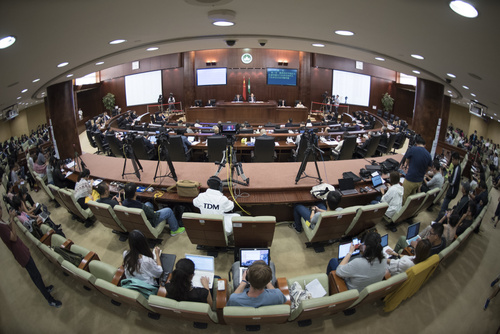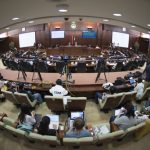 The Chief Executive, Mr Chui Sai On, takes legislators’ questions on Government policy and social issues during a plenary session of the Legislative Assembly.
The Chief Executive, Mr Chui Sai On, takes legislators’ questions on Government policy and social issues during a plenary session of the Legislative Assembly.
The Government would allocate more land resources for the building of interim housing, in order that old districts of the city can be improved under the guidance of the Urban Renewal Committee. The Chief Executive, Mr Chui Sai On, made his remarks today during a plenary meeting of the Legislative Assembly. The Chief Executive attended the afternoon session to answer questions from Assembly members regarding Government policy and social issues. Mr Chui said well-designed legislation was important for efficient redevelopment of Macao’s old districts. Such legislation would need to clarify issues such as the scale of redevelopment work; tax measures; and how urban renewal should be carried out – whether by a Government-led initiative or by forming a Government-owned company for redevelopment of the city’s old districts. The Government would first submit a proposal regarding how to perform the work of urban renewal, he said. In addition, Mr Chui said the Government would need to allocate a total of 88,806 square metres of land to compensate those developers that had already been required to relocate projects in order to enable Government-supported schemes to be built. Those schemes included: public housing at, respectively, Seac Pai Van and Ilha Verde; the Golden Lotus Square; and the solid waste incinerator plant in Taipa; and the sites used to build casinos and resorts such as Wynn Macau and MGM Macau on Macao peninsula, and Galaxy Macau on Cotai. Regarding land usage, Mr Chui said any plots of land that reverted to the Government would from now on be considered – on a priority basis – for public housing units; for facilities for the general public; and for offices for Government departments. Such a priority system for land use would also apply in newly-reclaimed areas, he added. The Government had previously announced a plan to build 4,000 additional public housing units. Additionally, a total of 28,000 public housing units would be built in the new urban zone known as Area A, a reclamation site. The Government was confident that in the coming five years it would be able to: increase the amount of land it held in reserve; enhance the system for the management of land resources; and step up efforts regarding urban planning, Mr Chui stated. The Government expected that research on Macao’s urban development – relating to a period covering 2016 to 2030 – would be completed in August, said the Chief Executive. The research would provide suggestions for the city’s overall development. Once the research was done, the Government would press ahead with a master plan for Macao’s urban planning, stated Mr Chui. Macao’s urban development would take account of three perspectives: the national one; the regional one; and the city’s own outlook. Goals set in the urban planning master plan would relate to the strategy of transforming Macao into a world centre of tourism and leisure. The Government would additionally closely follow the Urban Planning Law when initiating the master plan.


